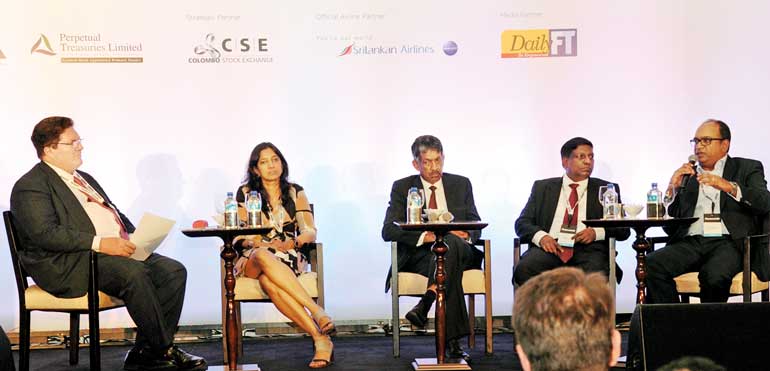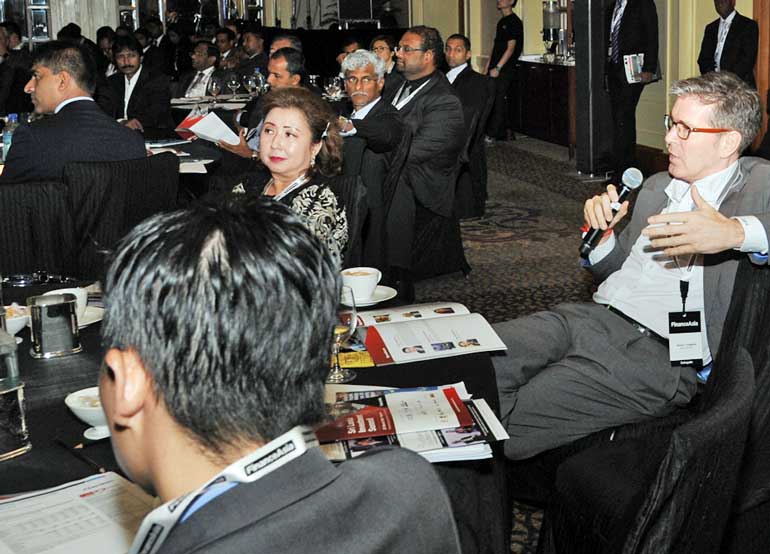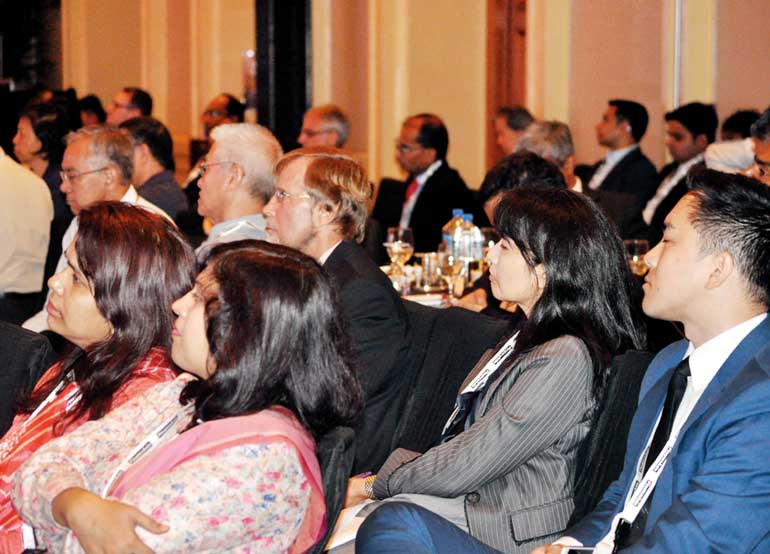Monday Feb 23, 2026
Monday Feb 23, 2026
Monday, 11 April 2016 00:00 - - {{hitsCtrl.values.hits}}

Sunshine Holdings Plc Group Managing Director Vish Govindasamy (right) speaks at the panel discussion titled ‘CEOs Insights’ at the Sri Lanka Summit held in Four Seasons Hotel in Singapore recently. Others from left are Standard Chartered Bank Sri Lanka CEO Jim McCabe, Ceylon Biscuits Group Managing Director Shemali Wickramasingha, DFCC Bank CEO Arjun Fernando and Singer Sri Lanka Group CEO Asoka Pieris.
A group of private sector leaders at the recently concluded Sri Lanka Summit in Singapore expressed optimism about growth and prospects for investments despite many challenges faced from an internal and external perspective.
This view was shared during a panel discussion titled ‘CEOs Insights’ involving Singer Sri Lanka Group CEO Asoka Pieris, Sunshine Holdings Plc Group Managing Director Vish Govindasamy, Ceylon Biscuits Group Managing Director Shemali Wickramasingha and DFCC Bank CEO Arjun Fernando. The session was moderated by the Summit’s International Sponsor Standard Chartered Bank Sri Lanka CEO Jim McCabe. The session looked at how leading Sri Lankan corporates are mapping their way to growth and navigating through the domestic risks to strategically plan for long term sustainable returns. Following are excerpts of the session:
Q: (Moderator Jim McCabe): What are the risks you see?
Vish Govindasamy: The workforce is going to be a challenge going forward. Getting a good labour force is going to be a challenge even though we keep saying we have abundance in labour. With the tourism market improving there is huge demand for skilled labour, so that’s going to be a challenge. Also it is no longer cheap labour. I think our wages are keeping up to the rest of the world and that’s probably going to be a challenge. We need to improve our exports. So getting new destinations, especially for the tea business our traditional market which is the Middle East and 70% of our traditional markets are under turmoil – the entire Middle East, Russia and Ukraine. So we need to diversify into other markets.
Asoka Pieris: I think there are some temporary challenges like the exchange rate, devaluation and interest rates, but I don’t see those as medium term challenges and those are short term challenges. The medium term challenges are actually to keep pace with the market.
Arjun Fernando: The space in the financial services market is crowded but one of the challenges is the threat coming from Telcos coming to payment business. I think banks were sleeping while Telco’s moved into the payment space. Now, we are looking at partnering Telcos to add value to the customers. We also want to seek opportunities especially with some of the foreign banks focusing on the niche areas they want to play in local market especially in Sri Lanka, which is opening up some areas of new business for us so we would be capitalising on that. Another challenge is the human resource, in getting young quality people. Unlike in the past when you join a bank, you expect the people to wait for 15-20 years and have careers, but today if you retain a new entrant for over three years I think you’re doing well. How do you really invest in them and keep them motivated at the same time.
Sheamali Wickramasingha: Consumer needs and wants change very rapidly. A few decades back you see brands coming in to the market and last pretty much a life time. Today you see brands coming in and their life span is just a few months. That is the nature of our consumers. Challenge is no longer to compete within yourself or the existing portfolio but to know and predict markets, change that’s coming. I think it is flattering when people copy your products.
When we put a product to the market, within two months there will be at least five ‘me too’ products. So the rate of innovation is very rapid. This is a challenge for everyone. Another is labour. There are a lot more opportunities for young people for value added jobs. I think Sri Lanka is coming to a point in time where it is worth investing in technology as opposed to having a lot of people. Our industry has employed close to 5,000 and in the coming years I would see that the numbers would be shrinking even despite more investments. We have challenges with signing up free trade agreements so we need to be globally competitive. We have big neighbours. So, these are all challenges.

Q: What is the role for financial investments in the food industry?
Sheamali: I believe there’s a lot of scope in the food industry. I remember 20 years ago, a Unilever executive said she was amazed that the biscuit industry is comparable to any other in the world. I think it is one industry that has consistently invested on technology. There are many aspects in our food industry which can get upgraded. Coconut is a big industry today, but many of the methods used are traditional. We use a lot of traditional methods, but to keep pace with the pricing challenges we really need to think and technology and R&D are areas which I believe has huge potential as well as improving supply chain and increasing yield.
Q: What kind of role can international investors play in the financial services industry?
Arjun Fernando: In DFCC 26% of our share holdings is held by foreign institutional investors. So there is interest. Further, we have an IT company called Synapsis, which is 100% DFCC owned, develops core banking and other software and we are talking with investors in Sri Lanka to come in terms of achieving access to other markets. Technology is playing a key role in the financial sector.
Q: How does Singer face competition?
Asoka Pieris: There is always competition internally in Sri Lanka. The other competition people talk about is ecommerce. However we don’t see ecommerce as a threat because we see it will help the total market to grow. eCommerce would grow faster than direct retail. But the non-ecommerce market also has potential for double digit growth considering the level of household penetration of goods and level of income standards. In terms of ecommerce market, six months ago we were fighting with one of the players but now we are partners. That is the way we would probably go. We have launched our own ecommerce web site partnering all ecommerce players as we have agreed what will be on the malls and online.
Q: International players are partners or foes?
Vish Govindasamy: Our entire business has been built with partnerships. Initially during the privatisation of plantation companies way back in the ‘90s we formed an alliance with the TATA Group when it was more difficult to get in to Sri Lanka. A few years back the Willmar Group joined us for the palm oil business. Either we fight the international investments or we form alliances. I think the alliances are a lot healthier and work positively. It keeps us from being complacent but keeps inventing. That’s one way Sri Lanka will move forward.
Q: What advice you would give investors here, to invest in Sri Lanka?
Vish Govindasamy: Being a Sri Lankan I would say it is one country in the region you should invest in for all the reasons that were given by the speakers. More than anything else, it is a peaceful place, a friendly place and whatever you’re going to invest would be protected. We have signed up with WTO. I think overall it’s a good destination for investment.
Asoka Pieris: Singer is a multinational company and has been in Sri Lanka since 1877. I think we have been close with the local community and as a multinational company we have never had a problem be it the authorities, customers or the local communities. I think that gives the confidence to the foreign shareholders to come and take shares in the Sri Lankan companies because you have to assurance that there’s no discrimination.
Arjun Fernando: In the financial sector from an investor’s perspective, I think what the Government does with strategic investments of EPF, SL Insurance Corporation and other state funds in some of the banking sector will determine the opportunities for foreign investors.
Sheamali Wickramasingha: There’s opportunity everywhere. I think one of the unique features of our country is that you have a very educated workforce and I think that will make a huge difference in wanting to get things done fast. Being a Sri Lankan company we have launched it to the international market, and if we can do that competitively from Sri Lanka, if you have the vision and conviction then there is no stopping.
Q: uestion from audience: What are the most challenging things for regional businesses which have grown in different environments? How to compete with the pricing with big multinational and in international markets?
Sheamali Wickramasingha: Yes we are a big fish locally in small pond but we do export and when people copy us we are flattered. We have one particular brand for milk shortcake which we developed at Ceylon Biscuits and we have many companies from India, Middle East, Indonesia actually copying and we have trade mark issues. So to answer your question, you have to offer something different. I think if you are a ‘me too’ competing against the multinational brands it is an uphill task.
I think the success of small companies in international markets is really focusing on a niche. As an example from our portfolio, Cream Crackers are traditionally a British biscuit and we compete on many international tenders and a lot of the cream crackers you eat are probably from our company. I think being a regional country we understand some of the sensitivities of the region, but it’s a challenge. Again when you take Sri Lanka, one of the differences is that, I think we have already got there. The infrastructure and services whether financial or otherwise is quite comparable to developed countries.
Vish Govindasamy: Dealing with those big brands is a huge challenge. The spending power that they have over small brands is huge. But we have to fix those niche things that we have towards our brands. For Example Ceylon Tea is something that we have to propagate and push forward when we are fighting with big brand names who cannot say it’s Pure Ceylon Tea. It is something we have to brand, and we have to work as a country towards getting that brand value out there. We also probably have the cleanest tea in Sri Lanka something that no other big brands can come out and say that.
I think Garment manufactures talked about what are their compliances, which we should take to the world as a Sri Lankan brand that is Rainforest compliant and Ethical Tea Partnership compliant. Taking this message is a very expensive challenge. Like said before, big brands have huge amounts of money to grow against us but that’s something that we have to keep working at.
The first two parts of Daily FT coverage on Sri Lanka Summit in Singapore were published on Monday and Friday last week and more coverage will appear in the next weeks. The Summit’s International Lead Sponsor was Standard Chartered Bank. Co-sponsors of the Summit were Asia Securities and Perpetual Treasuries. Colombo Stock Exchange was the Strategic Partner. Supporting organisations included the American Chamber of Commerce, Ceylon Chamber of Commerce, European Chamber of Commerce SL, Oxford Business Group and the Singapore Sri Lanka Business Association. SriLankan Airlines was the Official Airline Partner and Daily FT the Media Partner.
